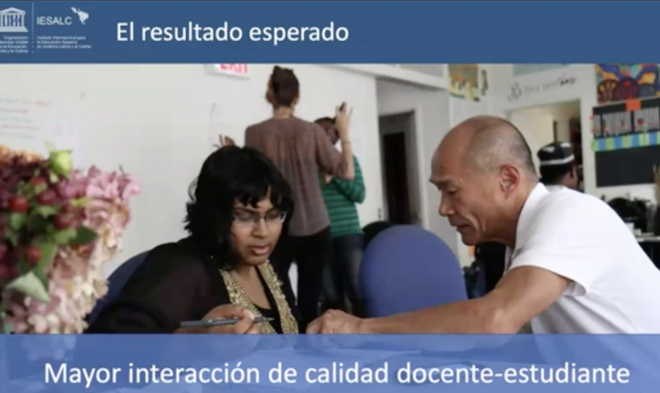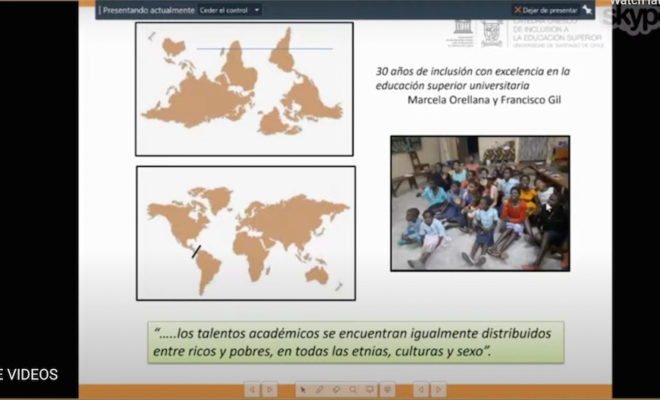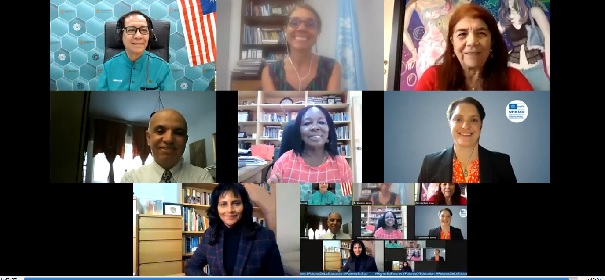IESALC highlights the impact on University Digitalization: Challenges and Opportunities

 Edutech Cluster organized the Impact on university digitization, challenges and opportunities EduTalk, to be held on June 09, 2020, at 5 pm, Madrid, Spain time zone, (GMT+2).
Edutech Cluster organized the Impact on university digitization, challenges and opportunities EduTalk, to be held on June 09, 2020, at 5 pm, Madrid, Spain time zone, (GMT+2).
The director of the UNESCO International Institute for Higher Education in Latin America and the Caribbean (IESALC), Francesc Pedró, as the EduTalk speaker delivered his presentation about the impact of digitization in universities and the challenges in higher education in the wake of Covid-19.
Edutech Cluster is an organization of companies, educational centers and universities working together to promote educational improvement through innovation.
EduTalk: Impact on university digitization, challenges and opportunities
Edutech presented this webinar moderated by Professor Gonzalo Jover, Dean of the Faculty of Education at the Universidad Complutense de Madrid, together with Francesc Pedró, Director of IESALC, an organization belonging to UNESCO.
Pedró began the conversation talking about the impact, challenges and opportunities involved in the digitalization of university education.
Is the university sector a good example of digital transformation? The Higher Education sector has been a pioneer in the use of technology in education. The use of the platforms is practically universal and is more widespread in the area of management.
More than 95% of European teachers work with technology, but in the field of teaching it drops to 65%.
In the field of technology, says Pedró, there are two extremes: those who demonize it, and the messianic collective that considers that we will change with attractive horizons but that is outside the comfort zone. “We need to approach the use of technology from the perspective of efficiency,” he said.
Pedagogies evolve rapidly: teaching strategies have evolved over the last 5 years. In Europe 25% of teachers believe that their teaching technology has evolved a lot.
Technology favors access to develop skills, allowing confidence in online higher education to grow, and this leads to a growth in public confidence in technology-supported distance education. There are growth opportunities for universities and industry as well, and this raises the following question: Why is the higher education market so difficult for technology? The answer contains several elements, such as the fact that the literature is extremely messianic and, although references are necessary, they do not provide answers to everyday problems.
In the conversation between Gonzalo Jover and Francesc Pedró, the following preoccupation about the different times due to the pandemic crisis was dealt with: the “teacher times”, where the teacher evaluated, reflected and transmitted the knowledge; and the “student times” which are carried along by the speed of technology, of immediacy. To this concern, Pedró pointed out that the domination of the times is being marked by students.
In the face of the COVID-19 pandemic, messianic solutions have proliferated, but the most basic ones are winning. These are the most widely used platforms during the pandemic. The most used ones are those that look like and feel close to what the teacher is doing.
Teachers trust their own abilities. And they need digital tools that allow them to confirm that their search manages to meet their objectives through this digital app, leading to the continuation of the predominant pro-free, anti-trade culture. This can be defined as being selfish, to a certain extent, because they concentrate and seek to use only what they have developed themselves, responding to their excess of self-confidence.
The world of teaching is still perceived as a private realm in which one has the last word, a self-sufficient realm.
Gonzalo Jover: “In the university changes are slow. Any change that one wants to introduce regarding the change of habits, has to be gradual. The university must take advantage of each professor’s resources and work in networks of professors”.
Like in every crisis, there are challenges and opportunities. IESALC has presented reports evaluating both spaces and stresses the fact that the use of mobile lines can be a window to achieve connectivity with the majority of the educational population that belongs to the 49% that do not have access to the internet or to a computer.
Among the challenges to overcome is the urgency for the university community not to get caught up in the Coronateaching syndrome. And although the coronavirus has led universities to experiment in the model of distance education, it is important to keep track of all the experience in order to recognize the positive and negative aspects, and what can be improved or discarded.
What can we expect for the day after? The most classic result is the one announced by the University of Cambridge. That in 2020-21 all master classes will be mediated by technology, except in the workshops and laboratories.
Hybridization turns out to be the most outstanding option among students as a study modality, allowing the university community to be present on campus and in their homes in order to complete studies without running the risk of contagion.
The secret for this methodology to be successful is to achieve a greater capacity of support mechanisms in the universities for the development of capacities to assume technology as an ally and not as a complication or punishment.
Never again will higher education be as easy as we thought it was.
As academics, we need to keep on being at the forefront in the use of technology, and that means putting the data on the table.
Universities are likely to be among the last priorities in the countries’ recovery plans. That is why it is necessary to create a public discourse reminding us that the university is a vehicle for social and economic mobility, for the search of solutions to poverty and environmental problems; and that to carry out this task, universities are better equipped than anyone else.
To listen to this webinar in its entirety and expand on what is highlighted in this note, enter here.
EduTalk: Impact on university digitization, challenges and opportunities
Moderator: Gonzalo Jover.
Speaker: Francesc Pedró.
Date: June 9th, 2020.
Time: 5 pm, Madrid, Spain time zone (GMT + 2).
RELATED ITEMS








